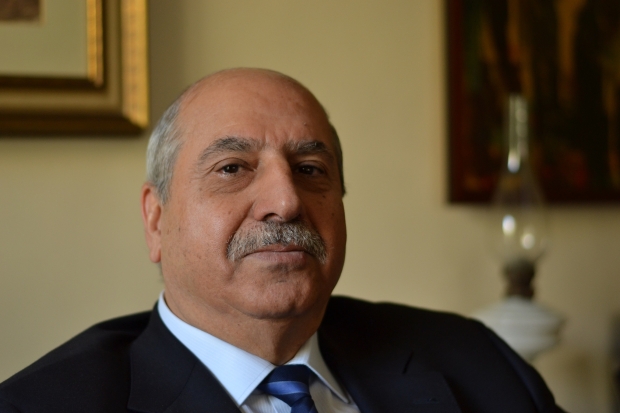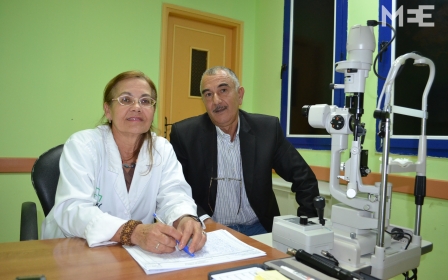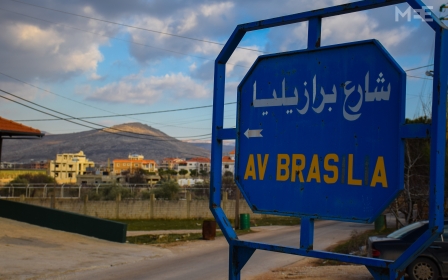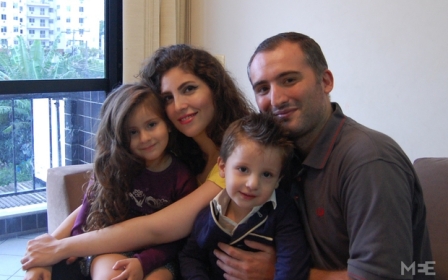Cuba and Jordan: A rebel alliance
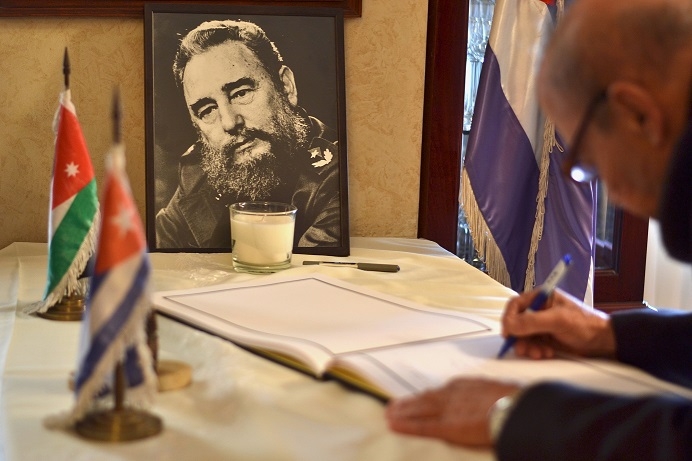
The portraits in Jabra Khoury's Cuban consular office in west Amman embody his position as a bridge between the Middle East and Latin America. Alongside photographs of the Colombian writer Gabriel García Márquez, the Chilean poet Pablo Neruda, and the former president of Chile Salvador Allende, are photographs of PFLP-founder George Habash, and the framed signature of former Egyptian president Gamal Abdel Nasser.
It is the day after the death of Fidel Castro, whose portrait also graces the wall, and during our interview, Khoury's phone rings incessantly. “All the calls are related to the death of Fidel,” he explained.
Despite his role as the Honorary Consul of Cuba to Jordan, Khoury is not Cuban. “I was born in Yaffa, Palestine,” Khoury says, but his family fled to Jerusalem during the Nakba in 1948, before settling in Amman in 1960. He is, he explained, only the second ever honorary consul of Cuba, the first being appointed before the Cuban revolution in 1959.
Cuban cigars as 'a bridge that facilitated access'
“I don't know why I ended up as an exception to the rule,” he said. Part of the answer, however, lies in that ubiquitous symbol of Cuba, the cigar. He explained that 16 years earlier the Cuban Ambassador to Syria, who also covered Jordan, asked whether there was anywhere in Jordan to buy Cuban cigars. As luck would have it, Khoury is also a Spanish-speaking cigar dealer.
Contact was made, and “Cuban cigars became like a bridge that facilitated access,” he explained. Soon the ambassador in Damascus offered him the role of Honorary Consul to Cuba. He accepted, “but I accepted out of love, not out of having the post of 'His Excellency the Honorary Consul', not out of an ego trip.”
Khoury insisted that in his role he doesn't “practise diplomacy”. Instead, he explained, he acted as a liaison between the Cuban Embassy in Damascus and the Jordanian Ministry of Foreign Affairs.
Khoury spoke with conviction and passion about the country he represents in Jordan, saying “Cuba is the richest country in dignity”. Like many of his generation, a defining moment of his political development came in 1968. “I became a friend and supporter to Cuba in 1968.” Of the late Fidel, he said:
“Fidel's achievement was to realise the return of Cuba to itself. Because Cuba was like a bordello, a cabaret,” referring to pre-revolutionary Cuba's position as a playground for rich, white elites.
Cuba and Jordan: diplomatic relations 'healthy and respectful'
Discussing the nature of the relationship between Cuba and Jordan, Khoury explained that the commercial links between Cuba and Jordan are “absolutely nothing”. He said that diplomatic relations between Cuba and Jordan are “healthy and respectful,” and that “Jordan is a country which has 'no complex' in establishing relations with other countries, including communist countries.”
On the political level, Khoury said, “Cuba fully understands, appreciates and respects the global vision and practise of Jordanian politics in many fields”. He added “I hope I'm clear.” One could wonder whether his careful wording alluded to Jordanian foreign policy, and Jordan's position as a key non-NATO ally to the United States.
As an Honorary Consul, he does not have diplomatic immunity, and when asked whether he felt constrained in what he can talk about, he said: “I am not here, as a consul, to practise or exercise political issues.”
“After all, I am not a Cuban diplomat”, he said. “I am an ordinary, normal, Jordanian citizen.” But like many Jordanians, Khoury is also Palestinian, and he inevitably speaks at length about Cuba's relationship with Palestine. “Cuba dedicated its ethical stance towards Palestine, ” he said.
Scholarships and solidarity
He speaks about the military support and training Cuba gave to Palestinian fighters, and the personal and political relationship between Castro and the Palestinian revolutionary, Yasser Arafat. The relationship which has most endured, however, especially post-Oslo, is the provision of educational scholarships by the Cuban government, to Palestinians in particular, but also Jordanians and Syrians.
As a father, Khoury says that he has instilled the value of education in his own daughters. He says that Palestinians' “best passport now is... education, university education. This is the real passport. Culture. Knowledge. That's what we're left with.” Cuba has played a notable role in the provision of this educational passport.
“Cuba has contributed generously in providing thousands of scholarships in Cuba for Palestinians and Jordanians, through political parties, PLO, and friendship societies,” Khoury said.
Khoury's consular jurisdiction includes the West Bank, and a large part of his job involves sorting out visas for Palestinian students to travel to Cuba to study. He also explained that he helps in the renewal of Cuban passports to the small Cuban-Palestinian community in Palestine and Jordan, as well as the issuance of tourist visas to Cuba.
Cuba and Syria: a decades-old relationship
Cuba's role in the Arab World has always encompassed more than just the Palestinian struggle. The political and historical context which led to Cuban support for the Palestinian struggle, based on anti-colonial politics, happened in tandem with the building of relationships with the non-aligned countries of the Arab World, in particular Algeria, Egypt, Libya and Syria. It is partly in this context of the Non-Aligned Movement that Cuba's continuing support for the Syrian state can be understood.
When asked about Cuba's position towards the Syrian government, Khoury explained it like this:
“Cuba is a grateful country. When the non-aligned forces started to emerge, Nasser of Egypt worked hard to integrate Cuba in this group of countries. And they [Cubans] never forgot that. [For] Latin America, Nasser was a source of inspiration to them. And this has helped to enhance the relationships, whether emotional relationships or relationships of interest, with the Arab World.
Amongst these non-aligned countries is Syria, Khoury explains Cuba's current position regarding Syria, and says that Cuba maintains an embassy in Damascus which “has not been closed for a single day since March 2011,” the beginning of the protests that would escalate to the war which continues to devastate the country and its population to this day.
Holding on to the dream of pan-Arabism
Khoury said that “the most important thing is the static and firm position of the Cuban government vis-a-vis the Syrian state”. He rejected the word 'regime,' and said “No, we are talking of 'ld-dawla'. The state. The country.”
To many readers, however, a distinction between the Syrian state, the Assad family and the Baath party may seem difficult to make. Khoury said that “Bashar has proven to be a man with guts, who did not run away.
He said that the Arab Spring had been a “disaster” for the Arab World, and talked about the fact that he sees in the Arab revolts forces at play which he believed wanted to fragment the Middle East along ethnic and sectarian lines, undoing the dream of pan-Arabism.
In fact, he said, we can no longer talk of an 'Arab World', “Because now we have Arab worlds. There is no longer an Arab World. We have to admit that.”
Cuban support for Assad: beyond the symbolic?
When asked what specific support Cuba has given to the Syrian state over the last five years, he said the support is more like an “exchange in a good number of fields. It's like bartering. Cuba does not have money to give,” he said, but “Cuba is a country that is very generous within its means.”
Khoury said there were no Cuban troops in Syria. “If assistance is needed in the field of medical services, they [Cuba] would gladly help, because Syria is in a state of haemorrhage. Exchange in scholarships, for example, knowledge, know-how, pharmaceuticals.”
Cuban doctors are one of its most valuable exports, and after Hurricane Katrina in 2005 Castro offered to send 1,500 doctors to the southern United States to help with the relief effort, though this offer was ignored.
On the question of whether or not Cuban doctors were in Syria now, Khoury replied that he did not know, but that he “wouldn't be surprised.”
Mourning the death of Fidel
The next day I visited Khoury's home next to the consulate, in a quiet street in West Amman, where the Cuban flag is hung at half-mast. Inside, a book of condolences for Fidel is being signed by a continuous flow of people, who called to pay their respects, drink coffee, and discuss the legacy of Fidel for the Arab World.
The reception area is busy, with constantly changing seating arrangements and people coming and going. There is a mixture of ages, men and women, and Spanish mingles with Arabic and English. The Venezuelan ambassador enters, and is greeted, in fluent Spanish, by a young Arab man who speaks of the affinity he feels for both Venezuela and Cuba.
There is a sense in this room that an important man has been lost, and in this corner of the Arab World the talk was of Fidel's legacy, and of how to continue his political vision.
These thoughts, of legacies, and of struggles to come, are shared by the current, imprisoned-PFLP leader Ahmad Saadat, who offered his condolences from his Israeli prison cell. He wrote:
"In my name, on behalf of all my fellow prisoners in Zionist jails, on behalf of the Popular Front, and in the name of our struggling people, we bid farewell to the great revolutionary leader."
“Farewell Comrade Fidel,” Saadat continued, as he pledged “to continue the struggle to fully achieve the lofty principles and goals for which you struggled."
Cuba's future in the Arab World
Even without Fidel, the relationship between Cuba and Palestinian political parties and organisations will continue, and the decades-old alliance between Cuba and Syria is unlikely to wane.
But Cuba is now entering uncharted territory; while the election of Donald Trump spells uncertainty for the thawing of relations between Cuba and the United States, it could also see Cuban and United States foreign policies in alignment over support for Assad.
Cuba has long been a friend to popular and anti-colonial struggles in the Arab World, but the Arab revolutions have created a shifting of political and ideological alliances. Cuba is now positioned, however peripherally and symbolically, on one side of a war which has seen the destruction of large parts of Syria, and an ongoing human catastrophe.
New MEE newsletter: Jerusalem Dispatch
Sign up to get the latest insights and analysis on Israel-Palestine, alongside Turkey Unpacked and other MEE newsletters
Middle East Eye delivers independent and unrivalled coverage and analysis of the Middle East, North Africa and beyond. To learn more about republishing this content and the associated fees, please fill out this form. More about MEE can be found here.


